#i wanted x men magneto testament but they didn’t have that one :(
Explore tagged Tumblr posts
Text
I just bought my first comic books! The first volume of the X-Men Epic Collection and the first two issues of X-Men (2024)
#i wanted x men magneto testament but they didn’t have that one :(#x men#x men comics#marvel#marvel comics#marijn talks#xmen#xmen comics
17 notes
·
View notes
Text
How Magneto became Jewish
Two decades ago, X-Men kicked off its superpowered film franchise in what was, perhaps to the uninitiated, an unlikely location: the depths of the Nazi Holocaust. Long before we meet the titular team, viewers are thrust in front of the iron gates of the Auschwitz death camp, where a boy is being separated from his parents. He screams and cries, seemingly to no avail, until a strange thing happens: The gates before him begin to bend and twist in a mockery of physics. The guards, flummoxed or terrified or both, knock the kid out, but he’s not dead yet. Not only does the boy live through his imprisonment, he goes on to become our heroes’ greatest nemesis: the nobly malevolent mutant known as Magneto.As the current cycle of the X-Men films draws to a close with this week’s Dark Phoenix, it’s worth remembering how it began — with the darkest chapter in Jewish history made manifest. The trauma of the Holocaust wasn’t just the background of some formative interaction, it served as the foundational element of a crucial character. From the jump, audiences are made to understand that the story of the X-Men mythos is, among other things, specifically driven by Jewishness.But, oddly enough, this was not always the case in the comics from which the X-Men emerged. When Magneto was first introduced in Jack Kirby and Stan Lee’s 1963 Marvel comic book The X-Men No. 1, Judaism was nowhere to be found. He was merely a stock villain — a guy who could manipulate magnetic fields and wanted the superpowered “mutant” offshoot of humanity to reign supreme. Fans of the X-Men brand might now take for granted Magneto’s origins as a Jewish Holocaust survivor, but this particular drive to save the mutant minority from genocidal hatred didn’t come into play for the character until 1981 — a full 18 years after his debut. More than anyone else, one man was responsible for this change: a Jewish boy with the distinctly Gentile-sounding name of Chris Claremont.That’s right, geeks of the world: Chris Claremont is Jewish. He’s world-famous among comic-book nerds for revolutionizing and defining the X-Men while writing them nonstop from 1975 to 1991. His father was a British non-Jew, but his mother was Jewish, so by the laws of Judaism, which favor matrilineality, Chris has been a Jew from birth — albeit, a nonreligious one. In fact, in 1971, the young Claremont went to live for a time on a socialist kibbutz in central Israel, Netiv HaLamed-Heh. It was there that the depth of the agony of the Holocaust for its survivors first struck him.
A still from the opening sequence of the 2000 movie X-Men, in which a young Magneto is screaming at the Auschwitz death camp.
Photo: Twentieth Century Fox

“The weirdest, most eloquent memory I have of the time on the kibbutz is, every Saturday night was movie night, and one of the first movies I remember seeing there was Judgment at Nuremberg,” Claremont tells me over the phone. “In that kibbutz were more than a few survivors of the Holocaust. And watching Richard Widmark up there doing his speeches, and showing footage, documentary footage, of the camps …” He trails off for a moment. “I mean, I can’t describe the silence in the room. It was like the air, the noise had just been inhaled. There was no sound at all. It was weird. It was terrifying.” It was in that moment that he learned a well-worn but potent truth. “Those who do not learn from the lessons of the past are destined to repeat it,” he says. “It’s something I’ve never forgot, and I hope I never will.”Once you know about Claremont’s Jewishness, a number of elements of his fabled X-Men run make a lot more sense. Claremont used Israel as a backdrop for his stories on a number of occasions and introduced a variety of fascinating Jewish characters, including the iconic teenage recruit to the team, Kitty Pryde, as well as Israeli Jews like Holocaust survivor and diplomat Gabrielle Haller and her massively superpowered child David Haller, a.k.a. Legion (whose father is X-Men leader Charles Xavier). And, of course, there’s Magneto.There wasn’t much in the way of motivation for the supervillain when Claremont took on the writing duties of the low-selling X-Men series a few years after he left the kibbutz. “He was your typical melodramatic, I guess, megavillain, for want of a better term,” the scribe recalls. “He believed in mutant supremacy. There was no reason given for it.” That said, this was the very belief that placed him in diametric opposition to Xavier and his dream of mutant-human coexistence. In Claremont’s eyes, there was potential for Magneto’s future there, if only he could surmount one obstacle: a somewhat bizarre, pre-Claremont story that ended with Magneto de-aged to the point of a baby. The X-Men were, meta-textually, left up a creek. “Every significant book at Marvel had its key antagonist,” Claremont says. “The Fantastic Four had Doctor Doom; Spider-Man had Doc Ock, among others; Thor had Loki, if not Surtur. Without Magneto, the X-Men had nobody.”

So began Claremont’s attempt to bring the Master of Magnetism back. He concocted some sci-fi mishegoss to return the antagonist to his adult status in the late 1970s, after which the character started tussling with various X-folks. His origins, however, remained obscure. It was only in the early 1980s that Claremont and his artist and fellow creative force, the late Dave Cockrum, came up with their master stroke. “We wanted to reenergize Magneto and redefine him in a way that made him a more credible adversary, but also a more credible person, in the same way that we embarked on doing that with the new team,” Claremont says. “Y’know, if we’re going to define a more rounded Wolverine and Nightcrawler and Ororo and Colossus” — all members of the X-Men — “then we could not leave their adversary in his original vacuum.”In Claremont’s recollection, the next step was “essentially sitting down and figuring out the who, what, where, when, and most especially the why of his life and his origin.” It had already been established in previous comics that Xavier had fought in the Korean War and was roughly the same age as Magneto. “That meant that Magneto had to have come to adolescence, and possibly come of age, in the Second World War,” Claremont says. “And he certainly looked European. And what would have given him such an extreme attitude toward mutant-human relations? Bingo.” It was one of those great moments that hardly ever happen outside the iterative arts of superhero comics and fan-fiction, moments where writers pick up the batons left by their predecessors and create backstories that the characters’ original creators had never intended — but that, nonetheless, fit perfectly. As Claremont puts it, “The next corollary was, Oh. The Holocaust.”
Next came a fateful snippet of dialogue in August 1981’s Uncanny X-Men No. 150. The story bore the simple, evocative title of “I, Magneto …” and, as you might expect, centered around a confrontation between the X-Men and their most notable enemy. Early on in the issue, Magneto speaks to captured X-Man Cyclops, who has recently lost his ladylove, Jean Grey. “I know something of grief,” Magneto barks. “Search throughout my homeland, you will find none who bear my name. Mine was a large family, and it was slaughtered — without mercy, without remorse.” That vague allusion is followed by a more specific one later in the issue. As the X-Men battle Magneto, he strikes down Kitty. He immediately regrets his action when he sees how young she is. “I remember my own childhood — the gas chambers at Auschwitz, the guards joking as they herded my family to their death,” the haughty villain says in regretful soliloquy. “As our lives were nothing to them, so human lives became nothing to me.” Suddenly, he has a change of heart. He realizes how hypocritical his actions over the previous 149 issues have been and disappears from the scene, his entire philosophy in question and a key fragment of his past revealed.



Excerpt from Uncanny X-Men No. 150. Photo: Dave Cockrum; Joe Rubinstein; Bob Wiacek; Glynis Wein; Tom Orz and Jean Simek/Marvel Entertainment Excerpt from Uncanny X-Men No. 150, featuring Kitty in the arms of Magneto. Photo: Dave Cockrum; Joe Rubinstein; Bob Wiacek; Glynis Wein; Tom Orz and Jean Simek/Marvel Entertainment You may notice something absent from that revelation: the word Jew. Throughout Marvel’s history, religion had been a major taboo, so one might assume that the vagueness of Magneto’s background was an editorial directive. Not so, says Claremont. “The reason we decided to err on the side of tact, discretion, use whatever word you like, in that regard, was that we weren’t playing with our character, per se,” he says. “He was a preestablished character, a Stan character, a Stan/Jack character. So we didn’t want to mess around with the core of his origin to that great an extent, certainly without getting a green light from Stan.”But there was another consideration, he says: “I wasn’t sure how it would play, how I wanted to make it play.” He opted to keep things a little ambiguous in part because he aimed to honor all victims of Nazi horror. “I wanted to keep everybody wondering exactly where we were going to land with this, partly because on one level, the Holocaust is a uniquely Jewish experience, but on another level, it was also, in European terms, a more universal experience as well,” Claremont says. “The Holocaust was specific to Judaism, but it also embraced a significant number of other minorities.”And so, throughout Claremont’s run, it was never made explicit that Magneto was Jewish. However, after the revelation of his Auschwitz background, he turned toward the light, feeling grief for his actions and walking a hero’s path. There were more than a few stabs in the direction of his ethnicity, such as the character’s fateful and emotional visit to the newly established U.S. Holocaust Memorial Museum in 1985’s Uncanny No. 199 and his subsequent decision to turn himself in for trial by the authorities of the world; and the time in Uncanny No. 211 when he hears that the mutants known as the Morlocks are to be exterminated and he cries, “No! The horrors of my childhood, born again, only this time, mutants are the victims, instead of Jews.” There were more and more hints, which you can find in this list of references — now out of date, but still useful. You would’ve had to be a fool not to assume Mags was Jewish, but there was still plausible deniability.

Excerpt from Uncanny X-Men No. 199. Photo: John Romita; Jr.; Dan Green; Glynis Oliver; Tom Orz; and Rick Parker/Marvel Entertainment
That ambiguity proved to be a handicap after Claremont left the X-Men in a huff in 1991. He abandoned his beloved characters in no small part because, as he recalls, Marvel editorial demanded that he turn his regretful and repentant Magneto back into a “badass” villain again. “You know, you spend the better part of two decades trying to make him a hero, and you get that platform pulled out from under you,” he says. “It’s like, Well, screw it. Even I have limits.” For whatever reason, Marvel went on to explicitly state that Magneto was a member of the Roma minority, which was also targeted for genocide by the Nazis. That reveal was later rescinded; it was a mere cover story that Magneto had adopted. Bizarrely, it wasn’t until 2009’s miniseries Magneto: Testament that Marvel made it canonically explicit that the character is Jewish. But by then, mass audiences had long accepted Magneto’s Jewishness thanks to the X-Men movies.
Claremont thinks that decision was “a superb choice” on the part of the filmmakers.Decades on, Claremont has a larger problem with how the cinematic adaptations, capped off by Simon Kinberg’s Dark Phoenix, shook out: He says the films didn’t focus enough on the kids. The titular team was comprised largely of adults and, although we see young students at times, they and their growth are rarely the focus. “The essence of the story, of the concept, should be on the kids,” he says. “And kids aren’t that certain. Kids aren’t that defined. Kids are always questioning. We need to see that. We need to understand that.” And it is here that he ties the loop back to the ethno-religious tradition that he shares with the supervillain he redefined and made iconic: “We need to get into that because, in the classic Hebraic tradition, you’ve got to ask questions,” Claremont says. “If you ask the questions, you get the answers that will lead you to the truth.” He pauses. “Hopefully.”
https://www.vulture.com/2019/06/dark-phoenix-how-the-x-men-magneto-became-jewish.html
#Chris Claremont#Jewish#Holocaust Mention#X-men#Magneto#marvel#Stan Lee#Jack Kirby#dave cockrum#XMCU#max eisenhardt#magneto testament
20 notes
·
View notes
Note
Comics this week (5/26/2021)?
Heroes Reborn #4: JAMES STOKOE?! Hahahahaha this shit ruled
Heroes Reborn: Magneto & The Mutant Force #1: Nothing revolutionary but if you're in for Orlando or any of a couple eras of X-Men worth a look-see.
X-Men #20: I recently realized Hickman's entire 'main' X-Men run has been nothing but setup for either what he'll do with his upcoming next book, X of Swords, or other titles in the line, and that the real story hasn't actually progressed since HoXPoX. Glad to see any sign of that changing soon.
The Marvels #2: My dad did want to get it himself after all, and it's a perfectly decent issue.
Miles Morales: Spider-Man #26: I think I'm done. This represented another slight uptick but I don't think I can justify continuing with a book defined by its occasional slight upticks anymore.
Abbott 1973 #5: This on the other hand flat-out sucked and I'm not bothering with whatever trilogy-capper's in store.
Haha #5: Another relatively not-horrifying one! Maybe Prince really is starting to vary himself a bit. In any case it's Walta so obviously it's gorgeous, if you're already in the tank for anyone involved this issue's a treat.
The Department of Truth #9: Oh boy howdy do I love me a good high-falutin' bullshit lecture issue. This can't exactly hang with Promethea in that regard but it's a respectable mere rung or two down.
The Blue Flame #1: This didn't knock my socks off the way I was hoping, but for a mini of I believe just a few issues I'm curious enough where it'll go.
Strange Adventures #10: I don't think it'll go for a disappointing 'actually it was Alanna all along!' ending at this point so I'm pretty wholeheartedly enjoying this testament to how hard my least-favorite character sucks. Everybody's fixed on the map, but personally my favorite art accomplishments of the issue were Doc's look at the Seafolk and Gerads' Alanna in flight.
Action Comics #1031: PKJ continues to strut his stuff but for me this was first and foremost a Sampere showcase issue, this is the most since Ryan Sook I've thought "this is the guy who should define Superman's interior art for the next decade".
Batman/Superman #18: Increasingly a slight Multiversity vibe to this whole thing even besides the dimension-hopping, with 'traditional' storytelling giving way to something more unsettling as a reveal of deeper social truths - I continue to extremely fuck with it.
RWBY/Justice League (digital) #10: A letdown tbh aside from Bennett clearly having her own take on the arc of Yang and Blake's relationship; I was hoping this is where her character talent would get a chance to shine, but not so much. It just feels shockingly perfunctory compared to her original run, though I suppose that's par for the course with crossovers, and I'll continue to hope for a more fruitful sequel.
Batman: Black and White #6:
Thomas/Randolph/Bennett: Unsurprisingly a fun little story coming from Thomas. However - and I'll concede it'd be hard to do a 'Batman realizes that as a white man however well-meaning he's still unconsciously practicing systemic racism' story I'd be 100% onboard for, and maybe that's just on me as a white guy who doesn't want that fictional idol despoiled in quite that way - I've never bought the idea that there are parts of Gotham Batman avoids, whether the East Side or the Cauldron or in this case The Hill.
Charretier/Colinet/Maher: Nice but we've all seen this exact story done better before, though the last panel of the kids' recounting was effectively striking and Charretier really struck the perfect visual balance for it.
Derington/Wands: Writing's not as good as it wants to be but who cares it's Derrington drawing Batman.
Arcudi/Harren/Napolitano: ...ok?
Snyder/Romita/Janson/Napolitano: It's fine, it's a Scott Snyder Batman story so you know roughly what you're getting (though his chapter in Detective Comics #1027 really should have been his last word on the character), and Romita Jr. does his best work in a minute here.
The Other History of the DC Universe #4: Probably the best issue since the first, bringing back a lot of the intimate focus in possessed and the same visible filter of how this particular character is perceiving things in a way the reader is inevitably going to clash with that gives the whole thing a charge. And my philosophy-major dad will definitely get a kick out of the last couple pages. Shame it didn't end with "AND THEN I RECRUITED THE SUPERMEN OF THE MULTIVERSE TO HELP BEAT UP MANDRAAK THE DARK MONITOR" though.
10 notes
·
View notes
Text
Movie Review: Dark Phoenix (Spoilers)

Spoiler Warning: I am posting this review the weekend after the movie is released worldwide, so if you haven’t yet seen the movie do not read on until you have or check out my non-spoiler review for a general overview.
Retelling Mistakes:
Alright so this is a Simon Kinberg movie first and an X-Men movie second, by which I mean I don’t think it should be judged as an X-Men movie before being judged as the brainchild of Simon Kinberg who is writer, producer and director of the movie.
Kinberg famously also wrote the script for X-Men: The Last Stand in 2006 which was the first cinematic attempt for him to tell the Dark Phoenix story. I want oit also to be noteworthy that The Last Stand is definitely a poorer movie in terms of story flow by trying to combine the Phoenix story with the Mutant Cure story and also for practically zero character development and an ending that felt as if the original trilogy fizzled.
However, despite Dark Phoenix being a slightly better movie overall than The Last Stand, it is almost as if Kinberg simply rehashed the same script but modified it to fit with the current group of characters who are somewhat different to those from the original trilogy.
Much like Mary Poppins Returns, Dark Phoenix has almost exactly the same scenes just told in a different way.
Starting with Jean in the mansion’s medical lab, just as she was after being found by Wolverine and Storm in X3. The only differences are Jean is there of her own accord after returning from seemingly absorbing a solar flare, Xavier and Logan aren’t examining her instead Hank is and the scene doesn’t end with a steamy romp on the table and instead Jean says she feels great and is dismissed.
Then there’s Jean’s home battle death in the first act. During X3 this is the scene almost immediately after the medical lab scene where Jean returns to her old home in a very fragile state. Xavier, Storm and Wolverine arrive to help Jean while Magneto and his new Brotherhood arrive to acquire her. It results in a couple of separate fights ending in Phoenix destroying Xavier.
In this movie though, Jean returns home and is hit with a bombshell about her past, leading the Phoenix to take over and be the sole combatant against the X-Men who arrive to help her. However, Mystique is the one who dies at the telekinetic hands of Phoenix via impalement rather than disintegration.
The ending scenes of the movie begin with shots of the X-Mansion before going on to Magneto playing chess. Here the shots are of the newly named Jean Grey School which go on to Xavier and Magneto playing chess in France while in X3 the shots of the mansion are of Storm welcoming new students and Magneto is later shown playing chess in the park.
It’s annoying when movies rehash the same scenes from popular movies but X3 is critically hated and mostly mocked by fans as potentially the worst X-Men movie aside from X-Men Origins: Wolverine. Also these scenes did not contribute to the original Dark Phoenix story and even to die-hard X-Men fans who remember these scenes from the animated series, you can’t help but compare to X3.
Characters:
Alright so now my big grumble with the movie is over, I am going to be talking about these characters in order of importance for the movie and in part my favourites the franchise as a whole.
Jean Grey:

Sophie Turner does a brilliant job here and is definitely the star of the movie, it could be argued Jean Grey has become the first X-Men character aside from Wolverine to get her own solo movie as “Dark Phoenix” is centric to her character.
But it is a fact that Sophie Turner did a fantastic job at brilliantly portraying the inner struggle that Jean had in this movie both physically and mentally. My favourite scene from her is probably when she is sat in the rain trying to scrub Mystique’s blood off while questioning her inner demon otherwise known as Phoenix as to why it made her do it. It was a short scene and if yo have seen it in the trailers you’ve pretty much seen it, but something about it in context works really well in the movie.
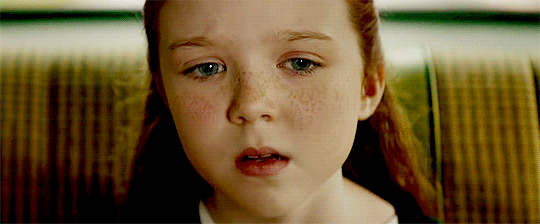
Also Jean as a child was also rather well portrayed, again we have a scene with Jean as a child opening X3 but while that scene is rather played down and strictly about Jean demonstrating the extent of her powers at that age, this one shows that her powers were in fact instrumental in her childhood trauma as she supposedly was responsible for killing her parents while her powers protected her from the debris.
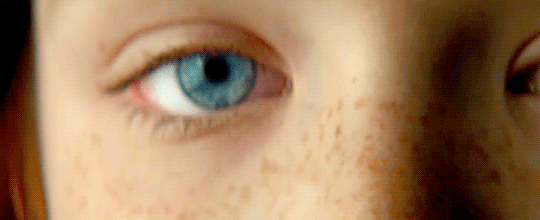
This was of course proven later to only be partly true as her father somehow survived the accident while her mother didn’t, but then her father effectively disowned her and gave her to Xavier.
Either way Summer Fontana does an okay job at portraying young Jean as an almost three-dimensional child dealing with what she has dealt with and feeling she is broken despite Xavier claiming she isn’t.
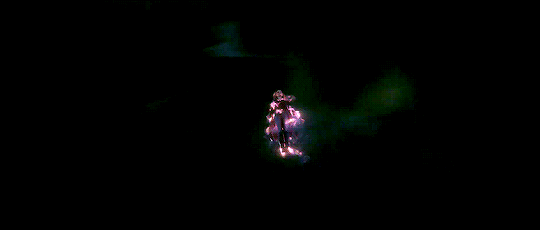
I really enjoyed seeing a better, more diverse, use of the Phoenix powers. Not only in the explanation that Jessica Chastain’s Vuk gave to the extent of the Phoenix power which felt very Guardians of the Galaxy Vol. 2 with Ego’s demonstration of his powers, but also in the way that Jean took control of Xavier’s body and made him walk up the stairs.
It wasn’t just simply a case of Phoenix being able to make things disintegrate and float as opposed to how it was in X3. I also really loved the pink energy that Jean had when using the Phoenix powers. I know in the comics this is Jean’s standard colour for using her powers like Scarlet Witch is red and Polaris is green but they never established Jean’s powers using pink energy before and the almost pink fire that accompanied the Phoenix powers made for a rather nice effect.
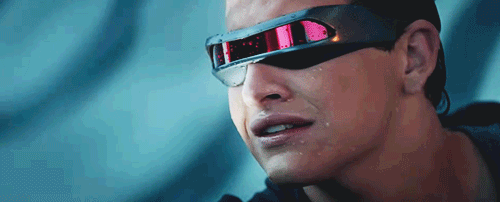
Jean’s relationship with Scott never felt as forced as I thought it would. It was pretty much the same set up as the Bruce/Natasha relationship in the MCU. I didn’t hate it there and I didn’t hate it here, I simply didn’t focus too much on it.
Although I will agree that in those early scenes at the mansion and that party that the way Jean was acting when with Scott was very Bella Swan from the hair to the almost socially awkward posture and movement.
However, I did love that the first official intimate moment between the two was after Jean was enhanced by the Phoenix which heightened all of her emotions, so you could say it was a three-way relationship at that point.
I did think the added development of her father being alive and Jean discovering that he had effectively disowned her added to her further decline to succumb to the Phoenix power.

Also seeing a fully-powered Jean explored here was fun to watch. From seeing her fly to using her telekinesis to operate a helicopter and even when she was Phoenix and dismantled Magneto’s Helmet, all of it was an impressive display of power.
We all know the timeline is slightly screwed in this universe but we are supposed to believe that in 1975 Jean Grey is 8 years old and with the present day events here being set in 1992 that would make the character 25 years old...there is little to no age difference between Jean here and in Apocalypse maybe aside from hair and fashion and that was set in the 80s.
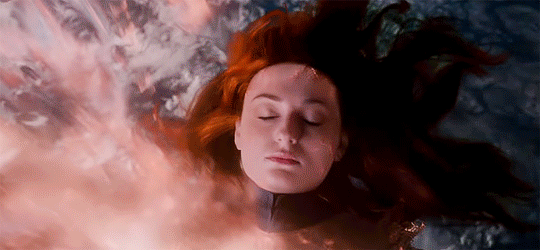
I thought Jean’s sacrifice at the end was both obvious and poignant. Obvious because Jean is meant to die at the end of the Dark Phoenix story but poignant because it was quite an emotional sacrifice more so than in The Last Stand.
I loved the inferno of pink fire that surrounded Phoenix and later Vuk as Jean kills them both essentially, it made for a more interesting climax than just Jean standing there disintegrating everything.
Overall Sophie Turner was definitely the best thing about the movie, I do think she maybe could have been a little bit more diverse in her acting as mostly she delivered lines on the same monotonic level but other than that I have no complaints...except maybe wanting to see her in the Dark Phoenix costume.
Beast:
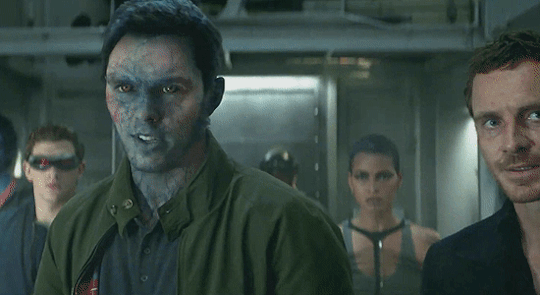
I will continue to say this, people do not give Nicholas Hoult enough credit as Hank McCoy/Beast.
Considering how he, McAvoy, Fassbender and J-Law are the only ones left from First Class, I think Hoult has played an under the radar performance but still one of notoriety.
I will say my only negative for this version of the character is I feel the way the fan-favourite character is portrayed is affected in the same way as Mystique has been portrayed in that the actors (Hoult and Lawrence) do not want to be in the blue make-up all the time and want to be able to be themselves for parts of the movie.
Now whereas Mystique can easily shapeshift and that is how they get away with that, to my knowledge once Beast’s mutation accelerated and turned McCoy into Beast, it was not irreversible in the comics but because of Hank’s serum he was able to shift between the two during Days of Future Past and Apocalypse.
Here though there didn’t really seem to be any explanation as to why he was able to shift so easily and rather than it being a case of a serum injection, it seemed to be more Hulk-like. I’m not complaining at seeing Nicholas Hoult in all his glory, but Beast being my favourite X-Man I want him to be treated with the respect he deserves.
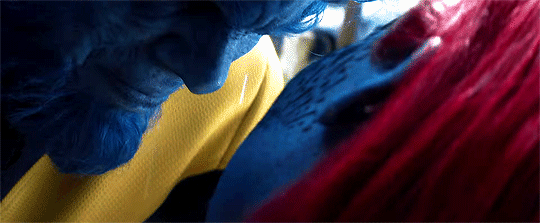
In the positives, I really liked seeing a darker side of Beast. But it wasn’t a straightforward Dark Beast as everyone believed it would be and simply Hank deciding that Xavier was not the answer in this situation and that Magneto was. I was fully on Beast’s side in this movie because not only did Jean accidentally murder his lover, but Xavier had such an incompetent attitude to the whole thing for fear of ruining their recent claim to fame that he had set aside the original morals he intended for the X-Men.
It is a testament to Hank’s morals though that after Xavier made his half-arsed apology that Beast decided to protect Jean because that is what Mystique would have done.
I am unsure how I feel about Beast now being the headmaster of the school, now called the Jean Grey School. I am all for the fact that Xavier decided to retire after the complete hash he made of “protecting his students” and I get that Hank is now the longest-serving member of the X-Men...but I do wish we had another movie to see him as a teacher/headteacher for me to decide fully.
I would like to see Beast in the MCU at some point either as Nicholas Hoult or Kelsey Grammar, but overall I just want Beast to return at some point as he is my favourite and I feel he needs more of a chance to shine.
Professor X:

I am thrilled with this movie for showing the darker side of Xavier, the only problem is rather than hinting at his darker side as they did in The Last Stand, they went down a hubris egotistical route before even starting to hint at his darker side which made what he did to Jean seem more like it was feeding into his hubris than actually doing the wrong thing for what he believed to be the right reason.
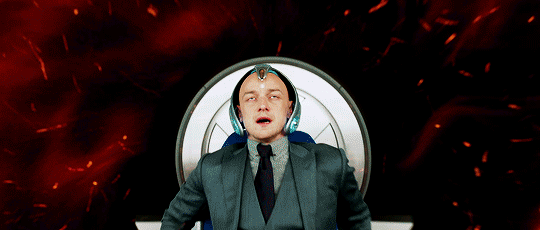
Also, as I said with Beast, Xavier simply came across as incompetent a lot in this movie and most of it seemed to be because he thought he was above reproach. When he agreed to send the X-Men into space to save those astronauts he was called out on his reason why by Mystique and yet played it off as him keeping the peace between humans and mutants so that they don’t go back to being hated.
When the team try and detain Jean, he is fine letting everyone put their lives at risk to try and stop her but when Beast has a taser ready to shoot, Xavier stops him and the cops in order for Mystique to talk her down which leads to her death...why not just let Beast taser her and then let Mystique talk to her back at the mansion?
Then when Hank and Xavier are having that talk, Xavier simply talks about how Mystique was in First Class rather than taking responsibility or apologising for not letting Beast take the shot, and even tries to turn it around on him for making him feel bad after burying his foster sister...bullshit!
I don’t know why or how the X-Men are suddenly public superheroes because Xavier was the one during First Class who stated that anonymity was their first line of defence and now the President has an X-Phone, it just seems like something the Avengers or Justice League would be but not the X-Men.

Also I loved it when he got talked down by Storm and Nightcrawler, it was simply the last straw that he had lost the respect of his students and team.
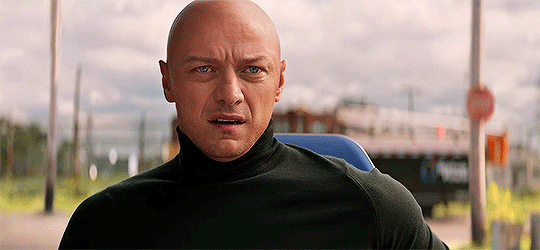
Don’t get me wrong, James McAvoy did a great job in the role as always, he like Hoult is one of those actors I will watch a film for regardless, but there was just something that didn’t feel as organic as the Xavier he had built up for the past 8 years.
I know McAvoy was filming Glass around the same time as this and you can tell because of the weight that he put on for the Beast role in that, but while McAvoy got the look of Xavier down with his fashion it was just something about the character’s motives that seemed really off.
Mystique:
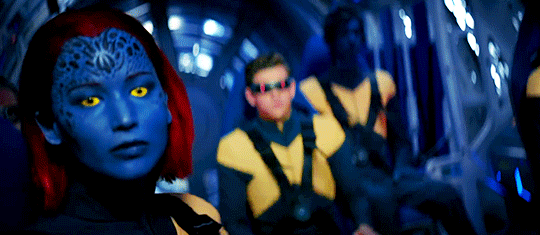
This was a straightforward character assassination for a great X-Men villain, particularly with what Rebecca Romijn did with the character in the original trilogy to have it being so desecrated in the 30-45 minutes that she is in here is such a shame.
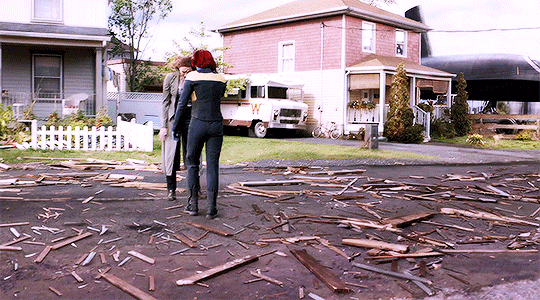
For one thing, she is never called Mystique once in this movie. Secondly, the make-up has gone from lizard-like to fancy dress. Third, as much as I liked Jennifer Lawrence’s delivery in this movie I detest the fact she died a hero, and that she was eulogised as “doing what she did best, dying trying to protect her friends”...
Mystique is a villain, she has moments of anti-heroism and her soft spots are often shown for her kids, but other than that she is manipulating, cold and calculated. She would definitely not die and be eulogised as “being the spirit of the X-Men”.
Also I say in the comics she has a soft-spot for her children, that’s great but in seven movies they have not established any familial connections between her, Rogue or Nightcrawler...despite many opportunities.
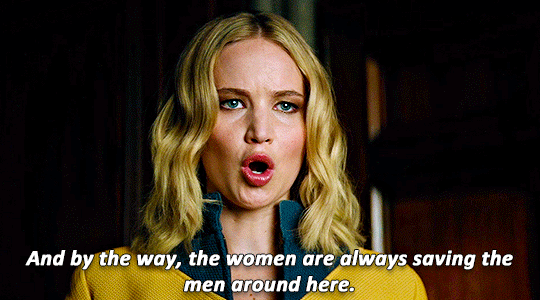
I do have positives though, as I said I did like Jennifer Lawrence’s delivery. I thought her line about how it usually being the women saving the men and changing the team name to X-Women was a good line, even though Mystique, Storm and Jean are really the only female members of the team they’ve shown in the First Class trilogy but they are still the more interesting ones, aside from Quicksilver and Beast.
I also liked it when she suggested to Hank that they leave the X-Men and run away together. I understand why Hank said no but I do agree that if they had done so it would have saved both of them.
Her duration in this movie simply felt like J-Law waiting to be released from her contract, you could tell that from her opening delivery to Nightcrawler as she exasperatingly says “Yes Kurt, we’re going into space” and the scene when the other rocket explodes and Mystique looks like she’s waiting for the inferno to take her.
Overall I am saddened that this is how Mystique ends in the movie universe, but at least there is still some good takeaway from her in the movie.
Magneto:
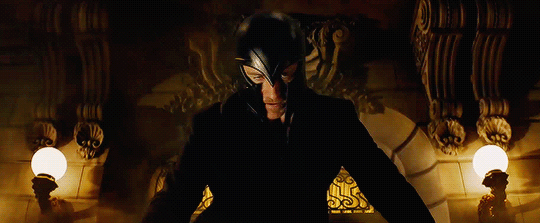
Could Magneto just pick a side and stick with it?! For one thing Genosha just seemed like a wilderness estate rather than a Mutant safe-haven. But while he was trying to be the peacekeeper here as soon as he hears of Mystique’s death he is right back into being a bad guy, but then a pep talk from Xavier and he is back being a good guy again.

I wouldn’t mind but he berates Xavier by saying “you’re always sorry and there’s always a speech but it never matters”, yet after Xavier gives a speech in the train he is somehow won over.
I really enjoyed the display of his powers in the movie, as always. The fact he and Jean battled to control a helicopter and both actors didn’t oversell it or make it look memeable is a testament to them both.
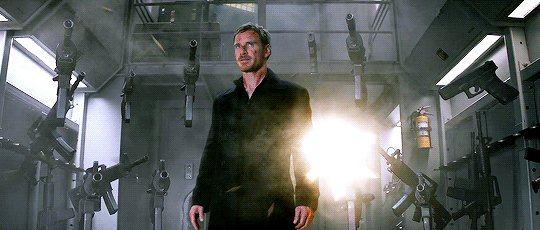
But I loved it in that street battle when he pulled up that underground train from the subway and managed to use it as a barricade between the building and the outside. Then later he equipped the SWAT agents’ guns in a full-on firing brigade against Vuk...yes it didn’t work but it was awesome.
I’m not too happy with where his story ended in this movie, the fact that he is now being Xavier’s saving grace seems a little bit against type for the character and also the fact he would either abandon Genosha or welcome his ethical enemy to Genosha just doesn’t sit right.
Cyclops:

I still enjoyed this version of Scott Summers than James Marsden’s performance, but I do agree that Cyclops’ visor really prohibits the actor wearing it from getting across much emotion in the scenes.
To be fair, Tye Sheridan does try and succeeds a lot here, but I still didn’t feel bad or empathetic for him most of the way through this movie.
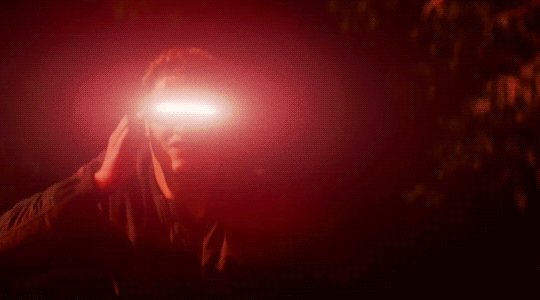
I think his optic blast power is one of the best the X-Men has both visually and from a power stand point, and I loved how the Blackbird has apparently become equipped with a blaster pod for Cyclops’ optic blast. I did want to see more of that but really Cyclops is the only member with that kind of power. Storm can easily carry out her powers regardless and the rest need to be within a certain distance.
Nightcrawler:
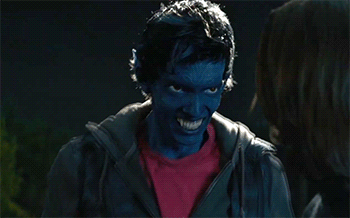
I felt myself very confused by Nightcrawler towards the end of this movie. When he tried saving that one SWAT agent whose son was a fan of his but was too late and so got angry, it just seemed very out of character to me.
Yes Nightcrawler has been involved in conflict in the comics but in the original trilogy he was very much the religious pacifist type of character. Going full demon could have been an interesting pathway for the character considering his father is Azazel, but literally slotting it in for five minutes of the final film does seem a bit like a throwaway plot point.
Also, despite it still being Kodi Smit-McPhee, I felt a lot of the freshness he brought to the character in Apocalypse was gone here, maybe because they didn’t show him as much but a lot of the humour from the last movie he had was gone here.
Vuk:

Everyone is simply calling her Jessica Chastain and to be fair it makes no difference what you call her because she’s barely developed as is.
Firstly this massive mystery role of hers is revealed to be the leader of a D’Bari army who seek the Phoenix power that destroyed their homeworld to help them remake Earth into their new homeworld. That’s great, and the D’Bari were in the original Dark Phoenix saga story, but nothing else is done to make Vuk menacing or threatening or even interesting.
I don’t understand the stomach twisting power they seemed to have, because it seemed like the biggest threat these aliens offer is to give their victims the worst stomach cramps imaginable, but the most laughable trait of theirs was literally charging at Jean as the Phoenix during the end of the film...even Vuk did.
I’m not saying they were bad as villains, they certainly filled that role, but they didn’t offer anything new or threatening and they certainly didn’t exceed what Apocalypse did.
Quicksilver:
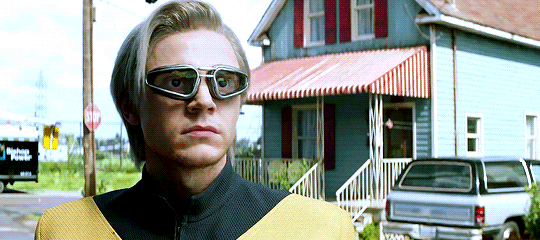
Quicksilver was shelved in this movie. Not only was he in the movie all together for probably 3 minutes less than Mystique, but also they cut everything about him that made him such a likeable character in the previous two movies.
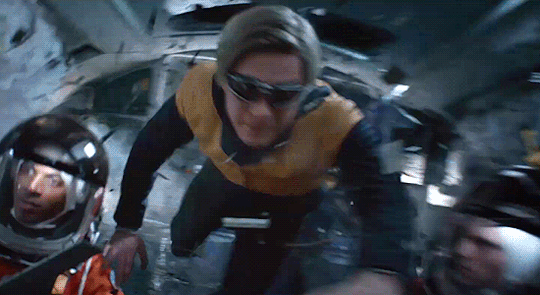
The humour was barely there, there was no brilliant slow motion speed scene, they still didn’t establish the relationship between him and Magneto despite Apocalypse seemingly teasing it would be explored. I know he got injured during the confrontation between the X-Men and Jean but to not even be mentioned for the rest of the movie except for a 5 second appearance right at the end?
Storm:
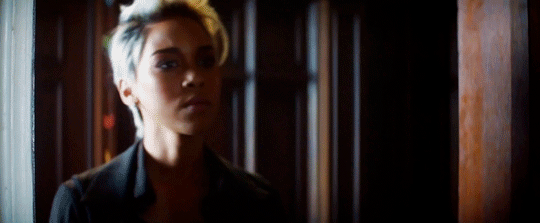
I will give Storm credit for being the only character in this movie to be called by their moniker, but Storm is only called by her moniker. Mystique calls Cyclops, Nightcrawler and Quicksilver Scott, Kurt and Peter on mission but also calls Storm Storm. Why not Ororo?
Also her powerset, particularly with Alexandra Shipp, seem very limited. The younger version of Storm only really seems to produce lightning and electrical attacks with the occasional heavy breeze. Here though she seems to also produce ice cubes for parties...because that’s a good use for one of the strongest X-Men?
Future:

I am unsure about the future of the X-Men now, while I cannot wait to see what the MCU does with them, Feige has stated that it won’t happen for a while at least.
I am hoping they start drip-feeding them in soon, say with Storm in Black Panther II and maybe Professor X in Doctor Strange II if they introduce the Illuminati.
I have loved these past 19 years of X-Men movies, yes there have been bumps in the road but it is a great comfort to watch and I don’t ever feel like they’re a guilty pleasure.
Overall I rate this movie a 7/10, it’s not an offensive movie like X-Men Origins or The Last Stand but it isn’t as strong as X2, First Class or Days of Future Past. I would still love to see a faithful Dark Phoenix saga movie maybe over the course of a couple of movies rather than just rammed into the one but I cannot really mark it down too much because it gave me the nostalgia I have whenever I watch an X-Men movie.
So that’s my review of Dark Phoenix, what did you guys think? Post your comments and check out more Marvel Movie Reviews as well as other movie reviews and posts.
#x-men#marvel#dark phoenix#x-men: dark phoenix#phoenix force#phoenix#20th century fox#fox#jean grey#professor x#magneto#quicksilver#nightcrawler#mystique#cyclops#storm#vuk#beast#charles xavier#erik lehnsherr#peter maximoff#kurt wagner#raven darkholme#ororo munroe#scott summers#hank mccoy#sophie turner#james mcavoy#michael fassbender#tye sheridan
20 notes
·
View notes
Text
The Timeline Up Through First Class
My approach to Erik is to recover and synthesize as much of the canon approach as possible while trying to pay a little bit more respect to militant oppressed groups than I think the source material often does.
So, for everyone’s convenience, here is this roleplay blog’s sequence of events:
Auschwitz Period: This will conform more or less perfectly to Magneto: Testament.
Post-Auschwitz Erik’s powers came to fruition after he left the concentration camp and his health recovered. At that time, he struggled to conform to a pattern of “normalcy” for his family’s sake. The Nuremburg trials, with their stiff formality, could not slake his nightmares or his anger at what the world had allowed to happen. As he followed them, his blood roiled. But he always had wanted to provide for his loved ones, to settle into a comfortable life, and so Magda coaxed him to live one. The Soviets swooped down on Poland, with a reign as brutal as the Nazis’, albeit in different ways. Erik burned to join the resistance, but Magda was pregnant and persuaded him to move to Ukraine, where the Russians felt more secure. There, Erik fell into an easy pattern—work in the mines, then evenings at the bar or with his growing wife and daughter. It was a simple life, particularly for a man as gifted as Erik, but he was a simple man desperate for the same strength of belonging he’d known in his boyhood family. With time, he could smile over Magda’s softness, tenderly kiss their daughters’ feet, and chuckle at the fringes of the talk men made over their beer. That peace didn’t last. Or—it was tenuous from the first. It terrified Erik how quickly others’ buried their dead. No one mentioned the war, or the Soviet yoke that followed. If Erik’s sharp tongue alluded to his past, brutal reality or the memories of the dead only silence or censure ensued. His neighbors and coworkers acted as though the victims, not the perpetrators of the crime, were untouchables, the diseased. At first, Erik bowed beneath Magda’s pleas not to torment people when they were finally finding happiness. At first he wondered if he was crazy. Yet somehow, as the memory of his family threatened to fade, as the world succeeded in making a fable of the concentration camps, rage inflamed him. Rage like he’d been too numb, too terrified, too young to feel in the camps. With the rage, his powers grew. As they grew, strange things began to happen around him. And the more that metal sang to his touch in the mines—this dour, Jewish outsider—the more others came to fear him. Then, one day, the village burned his house and his daughter to ash. That same day, the man who would be Magneto raised the village to the ground. His wife ran, and Erik couldn’t feel the betrayal of that, had no more room for bitterness. At the time, he thought he was the only one in the world. He thought he was cursed by the dead he’d left behind in Auschwitz, that he’d let the world forget. And he would not forget again. His family’s murderers were still out in the world. Justice had failed them, the guardians of the law had fled from its demands. And Erik, Erik was going to see the law that his family had loved, trusted even as it led them to the slaughter, fulfilled. He would hunt the National Socialists down. Every. Last. One.
Erik’s Mutant Discovery Phase: This hunt ran aground quickly. At first, Erik made good time teaching himself all the skills he needed to stalk his quarry. Such things came easily to him. Erik had been educated early in languages. It was his family’s pride to be well-rounded, to wield the power of knowledge that their people had used to weave their accomplishments into the fabric of their nations’ culture when no one would accept their blood or their faith. And Erik was exceptionally talented. To his old repertoire of skills he added shooting, lock picking with his powers, and martial arts. He habituated himself to an itinerant lifestyle in every way save for his loneliness, having never been without family. (Perhaps it was this that drove him to start a relationship with Peter and Wanda’s mother, however short-lived and unsuspecting of what they would birth.) But using his powers drew attention. By the time he was captured by a clandestine Soviet corps that had inherited Nazi experimental camps in Poland, Erik had assassinated five men. He was unprepared for the reality that other mutants existed, for the revelation that his curse was shared. The other mutants were very few—less than a dozen in number. They were kept separated as far as possible, isolated in their torments, but Erik had his first glimpse of mutants as a class of people transformed by chemical weapons, nuclear radiation, and experimentation. Magneto soon escaped those conditions. Everyone that the researchers had encountered before had minor mutations, at best: Changes of appearance, enhanced metabolisms, or poison breath. They didn’t have the capacity to imprison a man who could turn all their weapons against them. The mutants scattered, none yet realizing they were a race, a class of their own. They feared him as much as the researchers did. Confused, Erik pressed on with the only certain thing in his life: the hunt. He came upon Shaw’s trail, and the plot of X-men First Class ensued… with a few exceptions. Charles gave Magneto the gift he longed for most in the world: A family to belong to. Certainly, Erik was gratified to meet someone who thought on as global a scale as he did, someone who possessed the talents to convince him he was not the only being in the world endowed with his power. But Charles had none of the harrowing experiences it took to relate to Erik, and given Erik’s growing, fundamental belief that mutants were the blessed offspring of human atrocities he couldn’t stand how sheltered Charles was. If not for the fact that they began to assemble the X-men immediately upon meeting, he would not likely have trusted Erik so deeply or grown so defensive of him and the friends that they had assembled. As it was, Erik found himself racked with anxiety over how little his companions responded at first to the experience he tried to share with them: We will be persecuted, we are a precious thing they will try to repress, the reminder of what they made us should hurt them. Erik swiftly grew to love the group for struggling with the same existential fears and incredible gift he did. So when they finally caught up with Shaw, it wounded him that he had to shield his mind from Charles to do what was necessary. It wounded him that when he declared his victory over the man: You created me, but then, so did all the other humans who were there that day. And I am the testament against you all. You tortured my family. You killed my family—when he declared all that, Charles didn’t exult with him. When he emerged, to a world turning missiles on them—their saviors—for their efforts, he’d barely thought about his response. It was natural: turn the weapons back on those trying to kill them. Turn the force back. As would happen so many times after, what ensued from his decisions was a maelstrom. He couldn’t make sense of it. He remembered nothing but hot white rage like possession. He didn’t know how he’d ended up cradling Charles in his arms, drawing a bullet from Charles’s back. He didn’t know how he’d ended up pleading: But I’m right. I’m right–. We’re brothers, what we want–. No. That word was a betrayal. No. We do not. Erik swallowed the aftermath. He watched Charles Xavier wipe minds and erase the Cuban Missile Crisis as it had happened from history, and he tried to swallow how that disturbed him, too. Erik watched as Raven—shyly, but with gradual conviction—took in the events that ensued alongside him and reassured him that there was one among them who agreed with him. They watched Charles begin building a school, building a persona, and they watched him forgive human leaders. And forgive them. And forgive them. Over and over and over. He forgave students, too, though in a different way. He forgave humans as though they had never done anything wrong and students as though they had. Erik felt that Charles was waiting for an apology from him, too, and he didn’t intend to give it. When everything shattered, he’d known it was coming. He just hadn’t known how fast it would all move.
First Period of Resistance (The First Brotherhood): This is where I’m going to be a lot more flexible. The basic plot from here, as I see it, is that the U.S. government begins small programs to monitor and control mutants. Charles doesn’t react much, while Erik and Mystique take immediate action in retaliation. To their surprise, Charles turns their own kin against them to stop them, and everyone’s relationship goes from bad to worse. Magneto and mutants drawn to his first, dramatic entrance into politics form the Brotherhood. In its first incarnation, the group’s ethos is more or less the same as it will always be: Mutants were formed in the crucible of humanity’s worst, most horrific offenses, including nuclear holocaust and human experimentation. Rather than dying and becoming a dark spot to be met with silence and mourning they take violent action to make humans confront what they’ve made. They’re a liberation group, but in their first incarnation they don’t care much about collateral damage, feeling that those complacent enough not to fight the human leaders who have created them are complicit. They’ll take anyone, and they don’t really know how to lead a movement, so they quickly radicalize and grow more violent than I think either Erik or Mystique intend. This will all come to a head around the time that Magneto abducts Rogue, and afterward I imagine that he goes underground and leaves Toad to run the Brotherhood for a while.
After that I envision there being an:
Underground Period (The Brotherhood’s several iterations without Magneto)
Magneto’ s inevitably violent and bloody Resurgence
Second Period of Resistance: This is when Erik begins to form Genosha anew
And we can stick whatever madness you want from the First Period of Resistance on.
5 notes
·
View notes
Text
Amazing Spider-Man: Renew Your Vows Vol 2 #8-9 Thoughts
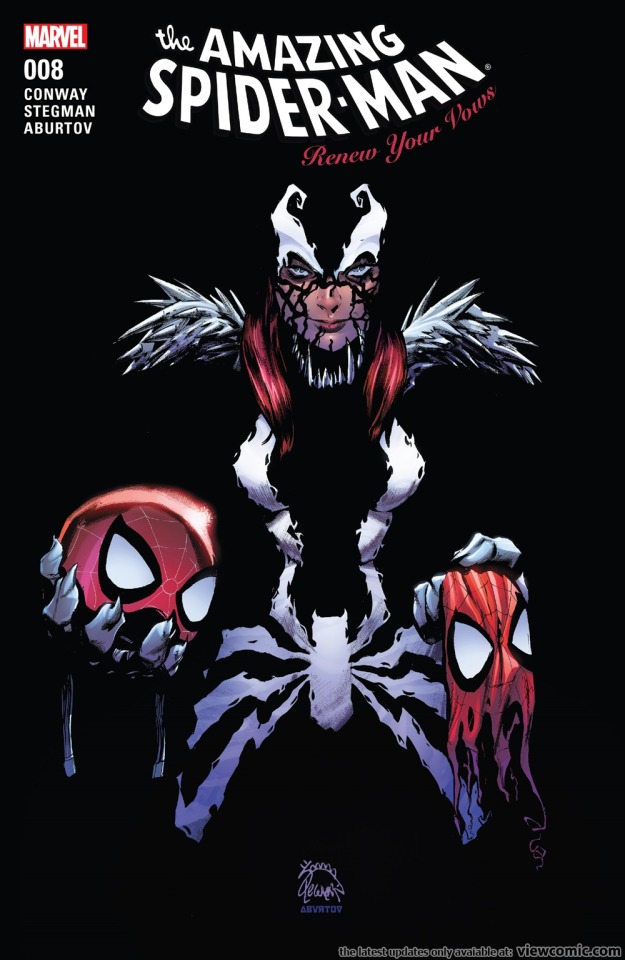
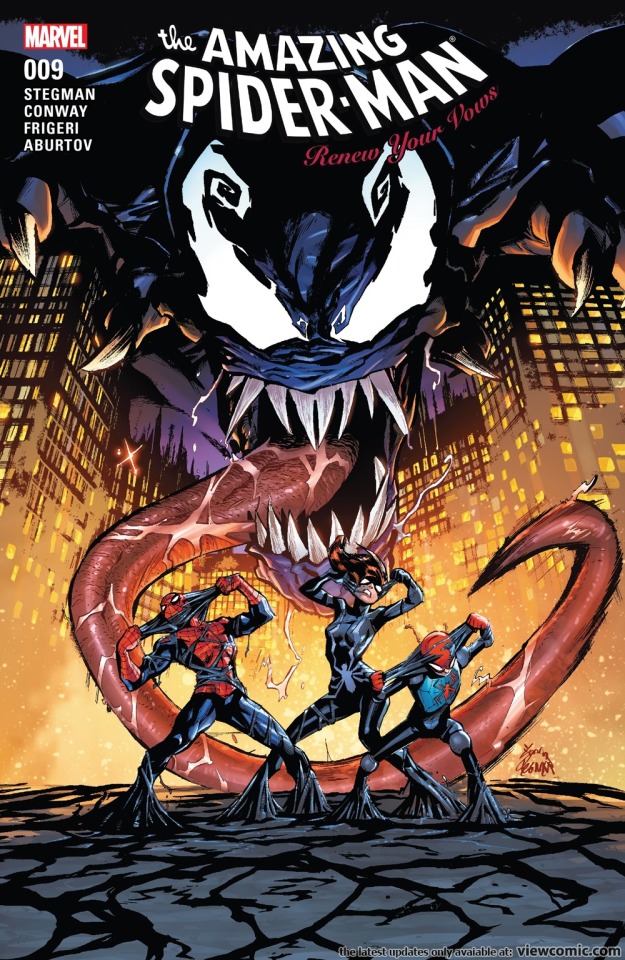
Previous thoughts here.
With the Venom movie having been released recently I felt this was the time to catch up with the Venom arc of Renew Your Vows.
I’ll not lie to you all, exempting the hype surrounding the announcement for the series no arc of Renew Your Vows had me more excited to read it than this one. I knew how it was broadly going to play out, even without being mildly spoiled, because of course the broad idea behind the story is the way every instance of the Venom symbiote bonding to people tends to play out.
But therein is why I was looking forward to it.
I.Love. VENOM!
Of course I do. As I mentioned in my post about the X-Men arc, I am a child of the 1990s and if you were a kid in the 1990s getting into Spider-Man then the chances were you loved Venom.
This is owed in no small part to the 3 part Alien Costume story arc from the 1994 Spider-Man cartoon which was for most people of my generation their introduction to the character and to Spider-Man as a whole.
It was in this cartoon that the very idea of the Venom symbiote acting as a corrupting force and a drug was first institutionalized and it has had an influence on absolutely every rendition of the character ever since, including in the original comics.
This idea, that this costume can change a character, make them evil, darker and more dangerous whilst accompanies with a cool black makeover for them, is critical to the appeal of Venom as a whole. It is why in fan art, fan fiction, adaptations and stories people love to attach the symbiotes to other characters.
Doing an arc featuring Venom in RYV was just the single most natural and perfect idea made even more natural by having MJ act as the host.
Whilst neither Venom nor the Spider-Marriage debuted in the decade, both were in significant ways shaped and promoted at their heaviest during the 1990s and RYV being a book clearly riffing on that decade (as it did in the prior arc) made Venom a welcome character to tackle. But it goes further than that. Venom has an important history and thematic connection to the Spider Marriage.
His co-creator David Michelinie truly began his long run on ASM (and thus became the chief architect of how Spider Marriage’s early years) in ASM #298-300, the arc introducing Venom where he infamously terrorized Mary Jane. So frightened was MJ of the visage of Venom that she asked peter to abandon his black costume permanently.
The Venom symbiote’s relationships with it’s hosts have also over the years been played as metaphorically romantic, with the second Venom story even floating the idea that it’s hatred of Spidey for rejecting it was rooted in something similar to love. Making the Venom symbiote symbolic of Spidey’s ‘scorned lover’ and thus the idea of it returning to haunt him in a series about his family and bonding with his wife utterly juicy.
And of course Venom was critical in the first volume of Renew Your Vows where Spider-Man seemingly killed Brock and the symbiote to save his family.
All this and it was IIRC the FIRST time that Gerry Conway was ever going to write for Venom.
So with all this in mind I was HYPED for this arc and remained HYPED for it long after it came out and I drifted off from reading comics in general.
Then of course we all learned that this arc was the main reason for why Conway left the RYV series, why Stegman had to handle some of the scripting duties and likely why we wound up with Houser and the controversial time skip.
And it was all because Marvel’s promotional department saw the sales of a MJ as Venom variant.
I am not making that up.
Basically this arc has a lot of baggage for me and for fans in general.
With all that said how did I feel about it when all was said and done.
Basically more could’ve been done with it but what we did get was pretty much solid!
In a way it’s a testament to sometimes the promotional department having good ideas. Sometimes. I also gotta give it up to Stegman. He stepped in for some of the scripting duties and really didn’t do a bad job at all.
Lets get the negatives out of the way.
· The story brings up Peter killing Eddie Brock but doesn’t really address it or explore it.
· As I said more could’ve been done with this.
· Annie barely appears and doesn’t significantly contribute to the story.
· The symbiote’s corruption of MJ isn’t the way the symbiote’s influence usually works in the comics or adaptations.
· Peter not cluing in immediately upon seeing MJ in costume that she’s bonded to Venom is questionable.
· So is Liz Allan not realizing Spinneret is MJ.
· So is MJ just immediately seeking out Liz to get new powers and wearing the ‘bio-suit’ without even talking to Peter about it. Not to mention her not realizing it is a symbiote.
HOWEVER...these are also small problems at best and/or stuff that can be explained away fairly easily.
· Like I said more could’ve been done but what was done was sufficient enough.
· Annie got a lot of play in issue #3, was equal with her parents in issue #4, was a little more than equal with them in issue #5 and was really the main focus in issues #6-7. So taking a break from her to give Peter and more notably MJ the spotlight is justifiable.
· The manner of the symbiote’s corruption could be explained via it being an AU but at the same time I think you could equally argue that the symbiote doesn’t generically make someone more aggressive and violent. In the 1994 cartoon arc (which I recently watched) there was the implication that the symbiote actually accentuates attributes of the host and removes inhibitions. So in the show Peter did become more aggressive, but he also became more selfish, more assertive, flirtatious, creepy, egotistical, touchy and such. In issue #2 it was established MJ does a lot of stuff and juggles it all and in this arc we see her basically become hyperactive, she does more becomes more of a go getter. Even if you do not buy that the costume’s affects are metaphorical of a drug and drug addiction and MJ’s ‘symptoms’ are not dissimilar to those displayed by people who use certain drugs. If this was the intention it is actually pretty genius.
· Peter not realizing he is dealing with Venom could be explained via his presumption that the symbiote was dead. But also on a deeper level his need to believe it was dead because of the threat it poses to him and his family and the traumatic memories associated with his killing of Brock. To have crossed that line and it been for nothing would be too horrible. As is the possibility of MJ being bonded to it. this isn’t even getting into how the symbiote just historically freaks Peter out. So basically MJ bonded to the symbiote is something Peter just doesn’t want to believe to the point where he doesn’t truly confront the idea until he has to and it becomes unavoidable.
· Liz not realizing Spinneret is Liz could be explained by unfortunately just a conceit of the whole secret identity concept.
· MJ’s actions could be explained as a result of her being freaked out by seeing Annie’s dying body. Parents (and stereotypically more commonly mothers) become emotionally unsettled when confronted with harm to their children and in this story MJ was so freaked out that she tossed an entire train at Mysterio (which Peter has done in 616 but the story claims he hasn’t in the RYV universe). Her rage is actually a nice tie-in for what we saw in issue #2 when Mole Man’s goons had Annie. So MJ’s questionable and impulsive actions might be the result of Mysterio screwing with her head.
Speaking of the Mysterio scene, it encapsulates something that I think was needed for the series by this point.
Not only does it explain MJ’s only been a superhero for 2 weeks but it showcases her inexperience relative to Peter. In prior arcs the series was slightly in danger of overwriting MJ at the expense of Peter, I am thinking more specifically of her single handily defeating Magneto in issue #7. And the manner in which MJ screws up in the train scene is totally believable and cuts to the heart of the series theme of family.
That scene along with the end of the story also displays some great, great relationship writing between Peter and MJ. It shows us how their dynamic works, how they can be playfully catty but also caring. So often we see MJ being the strong one, the shoulder for Peter to cry on but here she’s the one who needs him, she’s the one who screws up and whom he has to be strong for.
But wonderfully he doesn’t just save her and that’s it. He helps her by facilitating her the opportunity to save herself. The issue also manages to make Peter following her sidestep him being patronizing or creepy by framing it and acknowledging that it could across that way, whilst also not being the intention.
The relationship writing is really good even outside of the scenes where they are not together. MJ’s concerns about Peter resenting her and her not pulling her weight had me apprehensive at first because it is not true to their relationship in general. But the story made it clear they were referring to their dynamic as heroes specifically at which point MJ’s analogies and half truths when discussing her marriage at work made a lot more sense.
At the same time the series portrays Peter as very proactive and competent which is always nice to see and had I read these nearer their original release would’ve likely impacted me more since back then such a portrayal was lacking in the main book.
Speaking of which I appreciate that the series doesn’t feel the need to focus upon all three family members in each story. Issues #1-3 focussed upon them individually, issues #4-5 upon all three of them. Issues 6-7 upon the three of them but leaning towards Annie and issues #8-9 are about Peter and MJ, leaning more towards the latter. This mixing up of the dynamics helps keep things fresh and explore the family more fully.
You’d think then that Annie’s presence in the book would be superfluous filler but in fact what’s so clever in this arc is that Annie despite having little panel time is important in driving MJ
Now let’s get down to the main attraction, Venom.
I felt more could’ve been done but playing it as something that made MJ more hyperactive at times and exhausted at other times was a neat touch. Her outfit looked cool and the climax where she mentally duelled Venom was a wonderful way to pay off both her experiences in RYV vol 1 and ASM #300 with Venom, showing how much MJ has grown.
Finally Liz’s role in this story was...surprisingly effective.
In 616 I do not like Liz Allan being a villain but at the same time given her history (especially from the DeMatteis/Buscema run in the 1990s) I also have to admit it does make a lot of sense. This story in a weird way pays off the potential she had in that role and creates a compelling parallel between her and Mary Jane as mothers who are willing to go to extremes for their children and families.
Finally Stegman was God-tier in the art department as usual but Frigeri as guest artists did a surprisingly solid job nevertheless, with his style complimenting Stegman’s.
Over all I give this arc a solid B+
P.S. MJ having Spider Sense whilst bonded to the symbiote is...weird. The symbiote can’t really give you that power and even if could it didn’t alert her to Peter. Maybe the symbiote was altered by Liz and MJ never considered Peter a threat enough to register to her Spider Sense. The former aspect would help explain how and why she was apparently impervious to fire.
#ryv thoughts#Spider-Man: Renew Your Vows#Amazing Spider-Man: Renew Your Vows#spider-man renew your vows#Gerry Conway#ryan stegma#venom#Venom Symbiote#spinneret#mjwatsonedit#mary jane watson parker#mary jane watson#Spider-Man#Peter Parker#Anna May Parker#Liz Allan
33 notes
·
View notes
Text
Mutant Empire, Book 3, Chapter 7
Hello guys! Welcome to another installment my liveblogging all the Magneto bits from the Mutant Empire trilogy of X-Men novels. Tagging the usual Magneto crew @malakhvent @hexiva @muffiewrites @magnetician @superiorvengeance @actually-i-prefer-magneto @taintedhero @magnet-dad For those new to this, the “X-Men: Mutant Empire” books are a trilogy written by Christopher Golden in the 1990s. They are novels, not comic books, and the X-novels occupy a very shakey/debated place in canon. That said, they’re excellent characterization sources (in my opinion), especially for characters that didn’t get much in canon, such as Carmella Unuscione or the Kleinstock brothers. However, the characterization for Magneto (not what anyone would call a minor character!) has also been amazing, and is probably the most well-balanced portrayal I’ve ever seen of him. So I figured people would be interested it it and thus I’ve been posting the bits that have him in it as I read. If you want to catch up, check my mutant empire tag!
Anyway, Chapter 7 starts with Magneto gathering the noncombatant mutants (crappy powers, many don’t pass for human) of Haven (what he has re-dubbed Manhattan) to explain to them that “Haven was for them” because they are “the real reason he created Haven. They needed sanctuary quite badly.” Aw! That’s sweet!
“Several could not contain their need to speak of their pasts, their pitiful existences before Magneto became their savior, and he allowed them the opportunity.” ...and that’s kind of dickish. And I love it, because it perfectly frames the balance of Magneto’s devotion to the welfare of his fellow mutants with his grandiose narcissism and how he looks down on others (including those he wants to save), but he still feels responsible for them in part likely because of that narcissism. He’s their savior, after all! We get to see one such mutant, whose bestial appearance made a normal life impossible for him, doing just this. He tells Magneto he waited his whole life for “salvation” and had almost given up. Okay, this hurts me man, this gets me RIGHT HERE IN THE FEELS. Up til now I’ve mostly been pointing out how even though Magneto’s new system sounds great (aside from “mutants as the nobility/ruling class” bit), it would actually unjustly disenfranchised a lot of already underprivileged people, but the fact is that it does do the opposite for these folks, and they deserve it and it breaks my heart to know that this will be taken away from them by the end of the book.
Anyway, then the Acolytes show up to tell him that the human military is attacking and we get this line that I find so bitterly hilarious given today’s state: “Unfortunately, it appeared that the American government was not as rational as he had believed.” WAS THIS LINE AS LAUGHABLE IN THE 90s AS IT WAS NOW? We’re also told that, as low as his opinion already is of politicians and soldiers, he’s astonished it just got lower due to this. We’re also given this statement that is...surprising, but true: “But at heart, he was an optimist.” It’s in reference to his hope that this whole thing could have gone peacefully because he had “no desire to see humanity destroyed, to see cities crumble” because he is above “such petty sadism” but looks like he’s gonna have to break a few eggs to make this omelette. So, why do I think it’s true he’s an optimist? Well, optimist is maybe not the right world. Idealist, more like. People always call Charles that, but one post I saw pointed out that if you look at how they go about things, Charles is the realist and Magneto is the idealist. Magneto thinks positive social change can happen overnight (and has tried to do exactly that) via grand upheavals and dramatic high-publicity attacks, whereas Charles believes in working slowly within the system in public...and privately having a paramilitary strike force who can publicly stop the “evil” mutants and thus hopefully change, little by little, people’s minds about all mutants being bad. Charles gets that real, lasting change takes time and work and a very unglamorous grind, whereas Magneto has a much less complicated and, in its own way, more rosy view of things---I can just make them all act how I want, and then everything will be better! Anyway, Magneto goes to kick some human ass...and who should pop into his brain for a chat but Charles? As a note, Charles addresses him as “Magnus” here and not “Erik” because that was what everyone called him in the 90s for some reason? I think maybe there was a retcon in the 1990s that “Erik” was a fake name/identity he created when he came to the USA, and that Magnus was his *actual* real name, and then it went back to Erik later...most tumblrs I see call him Erik Magnus Lehnsherr, but that might just be a fandom thing to reconcile this weirdness. And then we found out his original name all along was Max Eisenhardt anyway! I think that was in Magneto Testament (which came out in 2008). ...yeah his “real name” is kind of a mess of retcons and changes, basically. Comics! Anyway, the conversation is the usual, but here’s the jist and some highlights - Charles says he could shut down Magnus’s mind , Magnus said he never would. This is quite a bit of an oversight by Golden (the author) since by this point in canon, Charles had already done exactly that (Mags got better) - Charles: "Now that your Sentinels have attacked federal troops--" Magneto: "They started it!" Charles: "How mature of you." ACTUAL CANON DIALOGUE DJFDFS - Charles shows Mags, to his shock, that people are evacuating due to the threat of a nuclear attack. He says if the USA doesn’t do it, Russia will, even if it destroys NYC. I guess Russia was kind of the go-to guys for this in the 90s, since I think it was the Russians who technically shot down Asteroid M after Fabian manipulated Magneto into scaring them enough. - Charles says Magneto’s flaw has always been that he underestimates humanity - And I would say that Charles underestimates Magneto, because he says he doesn’t think Magneto will kill any of the X-Men in cold blood. In the 1990s, that definitely depends on the writer, pal. But then, of course Charles thinks the best of him. - There is a feeling of despair and Magneto knows it comes from Charles, which bothers him because Charles is the “self-described eternal optimist” Anyway, Charles is unable to get Magneto to back down, the conversation ends, and Magneto explodes a helicopter. The final words of the chapter: “By any means necessary.”
6 notes
·
View notes
Note
Hey so I really want to get into marvel comics but I don't know where to start do you have any recs
oh boy do I. I mean, I have a whole post of “comics to read to get into the Marvel 616, from an MCU perspective”, and also Loki comics for MCU Loki fans (that ends on Agent of Asgard but serious-fuckinly read Agent of Asgard), and I have a doc in the works that I should...really finish at some point that’s basically meant to be a comprehensive recs list going from “starting points” to “going hard for comics”.
some ideas for series that aren’t on that list linked above that make pretty easy places to jump into comics (directly copy-pasted from that above mentioned comprehensive recs list I’ll finish...at some point)
Ms. Marvel by G. Willow Wilson. If you’ve heard anything about superhero comics in the last five years, you’ve probably heard about this series - and it lives up to the hype. G. Willow Wilson created a new character to take on the mantle of Ms. Marvel (formerly held by Carol Danvers, who is now known as Captain Marvel). Kamala Khan is a young Pakistani-American girl who idolizes her hero Carol Danvers - and then suddenly finds herself gifted (or burdened) with unexpected superpowers. The Ms. Marvel series tells the story of her growth into a hero, set parallel to her growth as a teenager. Fun but not frivolous, full of heart and stunningly moving, if you’ve never read a superhero comic this is a fantastic place to start that requires very minimal knowledge of the Marvel universe as a whole.
X-23: Innocence Lost and X-23: Target X by Craig Kyle and Christopher Yost. Laura Kinney is one of my all time favorite characters, and this series is an easy, no-frills introduction to her character. I’m putting these together because they more or less follow directly on each others’ heels, presenting Laura’s origin story and early days prior to her meeting up with the X-Men. A clone of Wolverine bred to kill, Laura’s story is about self-determination and coming to recognize her own humanity. (Her later series is further down on this list, for once you know where she comes from.)
All-New Wolverine by Tom Taylor. I’m listing this series as an easy one to jump into because it really doesn’t require knowing anything about Laura’s time as X-23. Know that she’s a clone of Logan, the first Wolverine, and this series is about her taking on that mantle, and you’re about set. A fantastic series that is not only a delight to read but also gloriously written, this was one of the best series to come out of Marvel’s post-Secret Wars reboot.
She-Hulk by Charles Soule. She-Hulk, or Jennifer Walters, is a Hulk-type superhero who is also a lawyer, and that is mostly what you need to know for this series - which relies more on the “lawyer” than the “superhero” part of things and is an even more excellent series for it, hitting all of the playful, light notes that make Jen such a fun character to read about. (Don’t get me wrong, it’s cool that the current Hulk series is really digging into her trauma post Civil War II event, but this is the Jen that I love. Canceled too soon, I’m still sad.
Alias by Brian Michael Bendis. There are a lot of people who really, really hate Bendis in the comics community, and they’re not necessarily wrong. Dude can be really, really infuriating. However, in my opinion Alias is some of his best work, showing that when he’s working on something that fits his particular talents he can be a good writer. This is the series the Jessica Jones Netflix show was based on, following a spectacularly dysfunctional former superhero who has abandoned the life to be a private eye.
Magneto by Cullen Bunn. A sadly short-run series focused on Magneto and Magneto alone that was just...really well done, and had art by one of my favorite artists (Gabriel Hernandez Walta). Magneto’s always a fave, and this series gave him his due, I felt. For another take on Magneto, specifically on his past as a Holocaust survivor, try Magneto: Testament by Greg Pak.
Storm: Make It Rain by Greg Pak. Another series canceled before its time - very easy to jump into as long as you have the basic information on who Storm is (mutant, can control the weather) - beautiful art, solid writing, wish it had gone on longer.
Young Avengers by Kieron Gillen. I mentioned this on the Loki recs list and I’m mentioning it again in case you didn’t hear me the first time. Not only is it just a really entertaining series with a really delightful group of teenage superheroes, it does a lot of fun things with comics format and panel work, and Gillen/McKelvie is kind of a dream team. Amazing stuff happens when they work together. (c.f. The Wicked and the Divine.)
X-Men: Season One by Dennis Hopeless. I hate the way Hopeless writes Laura Kinney but I really like this oneshot/introduction graphic novel - it’s based almost verbatim off the first few issues of X-Men back in the 60s, but with the difference that a) it’s drawn by Jamie McKelvie and b) it’s narrated by Jean Grey. You really don’t need to know anything going in - that’s what the Season One stories are designed to do - and looking at Jamie McKelvie’s pretty, pretty people is always a pleasure.
And I do like Hopeless’s voice for Jean, so there’s that.
series that are less personally my bag but I know other folks I’m friends with really enjoy:
unbeatable squirrel girl
patsy walker aka hellcat
moon girl and devil dinosaur
but honestly, in my experience the best way to get into comics is kind of just to jump in the deep end. pick a character you know you like and start reading their stuff - look up “[character] recs” and poke around seeing what people recommend. you’ll probably run into other characters you find interesting, or writers whose work you like, and follow them in different directions. personally, I have liked basically everything I’ve read by Kieron Gillen, Kelly Sue DeConnick, Matt Fraction, Greg Rucka, Marjorie Liu, and Bryan K. Vaughan; I’ve also enjoyed Ed Brubaker and Mark Waid.
you can also look through my comics recs tag - I put things in there when people ask me specific questions and also sometimes just when I’m feeling excited about something.
13 notes
·
View notes
Text
Where Senility Ends
Summary: Logan cares for Charles in the silo. Did I already write this setting? Too bad, have another one. I don’t even know if it’s heartbreaking or just worn out anymore.
WARNING: a rather graphic quote from x-men is used, regarding Auschwitz. It’s marked with a (5), and is that entire paragraph. It can be skipped
Logan walked into the fallen silo and slammed the door closed, making sure Charles wouldn’t be startled by his sudden appearance. It had taken him several months to realize the professor wasn’t always home anymore, and the times when he wasn’t were coming more and more frequently. Especially as Logan found the necessary medicines harder and harder to come by. It wasn’t that Chuck was becoming senile. He would just lose himself in his powers more often.
It hadn’t been so bad when Magneto had been around to help draw out the younger man. Logan had always admired Erik for his ability to remind Charles of just who and where he was. But the first of the seizures had taken that option out of the equation rather soundly.
Logan walked over to Charles bed and fell on the uncomfortable, stolen, hospital cot. He closed his eyes to the ranting professor, hoping to get some rest before he needed to go back out to the limo and pick up the next ungrateful fare.
“(1)We hold these truths to be self evident, that all men are created equal. (2)The taxpayers should not be required to finance items which are not official business but which are primarily political business. (3)Destroy a whole generation of those who have known how to walk with heads erect in God’s free air, and the next generation will rise against the oppressors and restore freedom.”
Logan threw an arm over his eyes. He already knew blocking out the mishmash of rhetoric was impossible. He couldn’t even know why Chuck was quoting old speeches. He really wished it would stop, though. Just for a few minutes. Just long enough for him to get some fucking shut-eye.
“(4)Good evening my fellow citizens: This government, as promised, has maintained the closest surveillance of the Soviet Military buildup on the island of Cuba. Within the past week, unmistakable evidence has established the fact that a series of offensive missile sites is now in preparation on that imprisoned island.”
Logan groaned and turned on his side, pressing a pillow over his ears. He had heard the damn speech enough times to have it memorized himself, and he wasn’t even American. It had been one of the first things that really clued the Institute off that all might not be well with their beloved Professor.
And it had been the emotionally constipated Magneto to notice it.
Logan still wasn’t sure why that particular speech had been the one to set off alarm bells, but it had certainly gotten old metal-bender’s panties in a twist. Or it would have, if he’d ever worn any.
And now, it was the only speech Charles would actually finish with any consistency. Of course, the Emancipation Proclamation was also on the short list, but that one showed up rather infrequently.
“(5)My name is Max Eisenhardt. I’ve been a Sonderkommando at Auschwitz for almost two years. I watched thousands of men, women, and children walk to their deaths. I pulled their bodies from the gas chambers. I dug out their teeth so the Germans could take their gold. And I carried them to the ovens, where I learned how to combine a child’s body with an old man’s to make them burn better.
“Alright, bub. That’s it for today.” Logan rolled off the cot and stumbled over to the man pruning his tomato plants.
“Oh, Logan, when did you come in?” Cloudy blue eyes tried their hardest to focus on Logan, as aware of him as they ever could be.
“About ten minutes ago, Chuck. I think it’s time to go to bed now.” Logan leaned more heavily on the wheelchair than he typically would, using its sturdy build to keep his aching bones upright.
“I can see that the sun is still up. I don’t really see the need for that quite yet.”
“Well I want some sleep, and you know I always sleep better when I know where you are.” There had been a time when such a confession would have prompted a wave of affectionate amusement from the man. Now, though, the telepath was always so drugged up that he couldn’t focus on projecting emotions. Or, that’s what he always claimed. Logan had the sneaking suspicion that Charles was far more coherent than he let on, and was simply avoiding the one mind that could give him all the answers he feared knowing. Logan understood and even approved of the hesitancy. He already had to take the burden of the school’s death on his shoulders. He didn't need the added work of comforting a heartbroken nonagenarian.
“(6)He was not at all an unpleasant person really, but clever, quick, proud, passionate and ambitious. He was one of those people who would be neither a follower nor a leader, but
only an aspiring heart, impatient in the failing body which imprisoned it.”
Logan huffed as he carefully set Charles on the mattress. Moving the blankets out from under thin legs was always the hardest part, if only because he was impatient to join the man. Having to listen to him spout off sonnets about dead people was just a bonus. “I know you love him, Chuck. You don’t have to remind me.”
“Why do you always assume I’m thinking of Erik?” Charles turned onto his side, expression soft and open as he watched Logan kick off his boots. “My words apply to you just as much as they ever do to him.” As soon as Logan was stretched out beside him, Charles nuzzled closer, wispy hair tangling with wiry beard. “It’s not my fault you’re an illiterate brute.”
Logan snorted and pulled the frail body closer to him, pressing in for comfort more than warmth. “(7)Well then, kiss me, – since my mother left her blessing on my brow, there has been a something wanting in my nature until now; I can dimly comprehend it, – that I might have been more kind.” Charles’ hand tightened its grip on Logan’s between them.
“Don’t leave me behind, Logan. I’m so alone already, and I don’t know why. I don’t know where my family has gone, and I’m rather afraid to ask.”
Logan’s old heart twisted at the way Charles’ voice shook. He swallowed hard against the lump in his throat, unable to present even a white lie. He knew it would ring false in their proximity. Instead, he kissed the bald pate below his chin, offering comfort and assurance of his presence. “I ain’t much anymore, Chuck, but you’re stuck with me.” He waited for a response, and glanced down when none came.
Charles was asleep, his breathing even, though his body still tense in fear. It would take a few minutes for Logan to relax, and cause a similar sensation of ease in the telepath. But it would happen. And in the evening, Caliban would enter and wake the pair. He wouldn’t comment on their intimate positions. Just on the lateness of the hour, and the need for a continued income, if they were to avoid unpleasant side effects.
It was one of the many reasons Logan managed not to stick his claws in the albino. Discretion. Dependability. Culinary skills. All were invaluable in the middle of the fucking desert Logan would call home until he had the funds to sail Charles out to sea, surrounded by water, surrounded by memories of Erik, and end their forsaken lives together.
Quoted speeches:
1. “I Have a Dream” Martin Luther King
2. “Checkers” Richard Nixon
3. “What is an American?” Harold Ickes
4. “On the Cuban Missile Crisis” John F. Kennedy
5. X-Men: Magneto Testament Vol 1 #14
6. “The Once and Future King” T.H.White
7. “From the Old Astronomer to his Pupil” Sarah Williams
#xavierine#my fic#logan movie#logan howlett#charles xavier#quotes upon quotes#boy or boy do i get why charles loves that book#please tell me what you thought#this wasn't what i wanted to write#and i have no idea how to feel about it#TELL ME HOW TO FEEL!#cherigan if you squint#i personally choose to squint
41 notes
·
View notes
Text
'92 to Bendis: Why I Love X-Men
Genesis of X
The year was 1992. That summer had seen my 8th birthday. It also saw my 4th open heart surgery. Born with a severe heart defect I endured hospital visit after hospital visit. Throughout those 8 years I spent many days and nights in the hospital. Truth be told most of it I don’t remember. Whether because of being so young or because my mind blocks it out I do not know. What I do know is that in October of that year X-Men: The Animated Series debuted. Until now I thought I merely loved the show because of it being a great cartoon with fantastic characters. However, as I typed this I realize a deeper reason connected me to the show.
As someone with a severe heart defect you become limited in what you are allowed to do. I couldn’t play sports. I couldn’t be outside in the heat or the cold. I couldn’t do many physical activities. Basically all of the things that a normal 8 year old boy wants to do I couldn’t do. I grew to appreciate things in doors such as; movies, TV shows, video games, and playing with action figures. While I had friends growing up my limitations inevitably led to feelings of alienation. In hindsight, I never really felt normal, and in October of ’92 I saw for the first time a team of people who knew what that was like. It’s no wonder I became a bigger fan of X-Men than any other cartoon. It appealed to me in a deeper, subconscious way that I didn’t understand until now.
I grew to love this show more than any other by watching the team struggle with prejudice, rejection, fear, and being outcasts. As they battled these social and personal issues I received inspiration from their ideologies and hope from their personal redemption arcs. This love for the show led me to convince my mom to buy me the comics. I remember her taking me every week to the comic book store. She would buy me the X-Men and Uncanny X-Men issues every month. My collection grew and grew to the point that I had filing cabinets and storage bins full of comic books. Some Batman, Spider-man, Nightwing, and others were amongst my collection, yet X-Men outranked them all.
I can recall stories such as the Phalanx Covenant, X-Cutioner’s Song, Onslaught, and Age of Apocalypse. Having grown up when I did these are the “classics” when I think of X-Men stories. I read every issue I could, and some multiple times. I still have storage containers full of comics from this phase in my life. Then somewhere after the Trial of Gambit the stories seemed to shift and I began to mature. I wasn’t as attached anymore and interest waned. The stories didn’t seem as well crafted, and characters like Marrow and Maggot couldn’t keep my attention. Once the X-Men film came out I attempted to get back into the comics, but ended up not enjoying them anymore. I had officially moved on from my first love.
Marvel Unlimited
Years later the Marvel Cinematic Universe was born. These films sparked a wildfire of interest in comics across the globe. They brought former readers back while simultaneously creating new ones. Around this time Marvel Unlimited had launched as well. Not nearly the behemoth it is now, it still had a solid 2,500 comics in 2007 at launch. Marvel created a way for the newer generation of readers to attach to them instead of the competition, and at the time of this writing they now have over 17,000 comics available. Between the films and this new service I subscribed to Unlimited and tried reading Avengers, Magneto, X-Factor, and Iron Man comics. I enjoyed the app, but my phone couldn’t handle it well and the stories weren’t gripping me. Ultimately I cancelled it.
The year was 2016. By the time summer began my daughter had finished 1st grade, my son turned 2 years old, and my wife and I celebrated 9 years together. My life had changed, and I was much different than that 8 year old kid who fell in love with X-Men. Adulthood in full swing I became a responsible husband and father. My life focused on providing and taking care of them. Their safety, future, and happiness became all that mattered to me. Never could anyone have known that during this phase of my life Brian Michael Bendis was about to make me fall in love with X-Men all over again.
During July of 2016 Marvel Unlimited ran a $1 for a month promotion. After realizing how many comics they added I decided to try it again. The updated app combined with my upgraded phone made reading comics a breeze. I could read a couple of pages here and there throughout the day, and couldn’t praise the service enough. Winter Soldier, Black Widow, and Captain Marvel were some of the comics I started reading. Then it hit me. In ’92 I fell in love with X-Men and the time had come for me to read Bendis’ All-New X-Men.
I began reading All-New X-Men and couldn’t stop. I flew through the entire 41 issue series plus tie in issues during the course of 6 days. Everything in me couldn’t get me to quit reading them. The series quickly became one of my favorite ever, and will likely stay that way. Once I finished this I went on to read all 35 issues of Bendis’ Uncanny X-Men run, and found myself as infatuated with it as All-New. Bendis provided something scintillating to the franchise that I personally hadn’t seen since the ‘92 X-Men: TAS. He gave a depth to each character during his run, and made everyone feel different from each other. There were no caricatures. Everyone came off unique, and the decisions they made fit within their personalities. Out of all the positive things I could say about his run my favorite things are the original five, Cyclops’ revolution, and the team ups.
The Original Five
In a society inundated with fictional heroes how could Bendis make the original five X-Men appealing? I mean they were created in 1963. A lot had changed over that time frame. Look at a Batman comic from the ‘60s vs now and you could easily see the tonal differences. The bright, colorful palettes of that time easily stand out against the dark, gritty concepts of our day. Yet Bendis found a way to keep these characters true to the Stan Lee versions and appeal to the modern generation of readers. It’s a testament to his skills as a writer. He crafted an overarching storyline about the original five X-men being brought from the past into the present. The idea being that current day Beast wanted to stop the Revolution of Cyclops.
His vision saw Beast becoming so obsessed with stopping modern day Cyclops that he brought the original five X-Men from the past to the present. This concept created a wonderful dynamic whenever the original five saw what type of people they grew up to be. From Beast’s reaction to the blue fur to Jean freaking out about her “destiny” of marrying Scott, becoming the Phoenix, and eventually dying. Watching these X-Men see what their lives become brought uniqueness to the comics. Over the course of the 41 issues of All-New X-Men they wrestled with their place in the current time stream and struggled with what fate really meant. Seeing them wrestle with this, with each other, and with the Revolution of Cyclops, in particular, provided a dynamic unlike any other that I have read.
Cyclops’ Revolution
Bendis made me do the unthinkable, fall in love with Cyclops. The perfect storm occurred. I had matured into the responsible family man when I read the revolution of Cyclops. His character took it upon himself to be the champion of all homo sapien superior. His team of Magik and Magneto were virtually unstoppable. He stood up to S.H.I.E.L.D. and the Avengers never for a moment backing down. He placed the mutant races survival as priority number 1, and didn’t flinch at the opposition. His own son and daughter might not have been the focal point, but Cyclops as a father was evident with how he fought for his kind.
I had been unfamiliar with this aspect of Cyclops. Nothing in the runs I read prior to this had ever painted this picture of him so strongly. His new mindset (which in reflection started before Bendis’ run) felt like a mixture of ideologies; Magneto’s and Xavier’s. Try for peace, but do what it takes to guarantee the survival of his “children”. As a husband and parent of two I can relate to this. I would do whatever it takes to ensure the protection of my family. Perhaps this relatability is why I grew to rank Cyclops near the top in terms of favorite comic characters. Bendis provided an angle and depth to him I hadn’t previously known.
The Team Ups
Throughout his run on both Uncanny and All-New Bendis infused the stories with team ups that made sense and felt unique. Yes, we have seen the X-Men and Shi’ar interact before, but Bendis made it compelling while appealing to nostalgia. The X-Men have long been known for their space exploration, but having them cross paths and work with The Guardians of the Galaxy felt natural. The move should have been done years ago, and on the surface looked like an opportunity to promote the MCU films. However, when reading the story, it clearly shows that the team up was seamless and fit the overall storyline perfectly.
The Trial of Jean Grey was a fantastic idea. Crafting a story that united the Guardians and Starjammers to battle the Shi’ar felt compelling and natural. The interplay between the groups created some hilarious moments as well as heartwarming scenes. The slow build between Star-Lord and Kitty could change the minds of even the staunchest Colossus/Kitty shippers. It didn’t feel like a normal comic book relationship where two people randomly hook up. Substance was provided to it by building it up with playful, flirty banter. I will always remember that part of his run.
Rebirth of X
I wish I could remember every detail of my feelings when first reading the Bendis run, but unfortunately I can’t. What I do remember is that I felt the rebirth of a love that had grown cold. From getting older to the arrival of the Marvel Cinematic Universe my original love of X-Men had dwindled. Thanks to a promotion for Marvel Unlimited & and incredible run from Bendis that love sprang forth again.
do�2�|��
0 notes